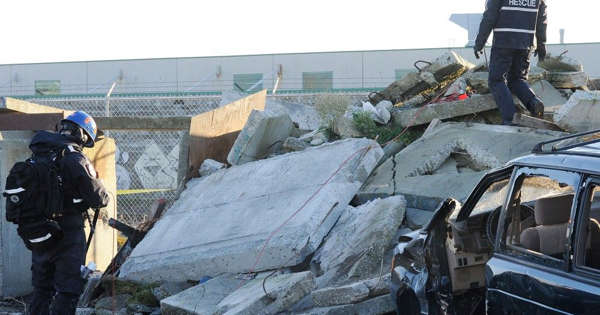
Members of Vancouver’s heavy urban search-and-rescue team are among the world’s elite, trained to rescue people from collapsed buildings in case of an earthquake off the Pacific coast. But almost a week after the massive and deadly Turkey-Syria earthquake, the team continues to watch from afar.
The federal government’s decision not to deploy Canada Task Force 1, one of six heavy urban search-and-rescue (HUSAR) teams located across the country, has been met with criticism and confusion.
“Speed is of the essence,” NDP MP Don Davies said Friday. “Seconds, minutes, hours make a difference.”
The representative for Vancouver-Kingsway said the Vancouver firefighters’ union contacted him earlier this week with concerns that the team was not being deployed. Turkey’s consul general in Vancouver, as well as members of the Turkish-Canadian community, have also questioned the decision.
Taylan Tokmak, the consul general, said he reached out to the Vancouver fire department to discuss HUSAR, but was told deployment decisions rest with the federal government. Shortly after, he was approached by the Burnaby Urban Search and Rescue team, an independent non-profit team, and was able to assist them with accreditation and flights.
Tokmak confirmed the Burnaby search-and-rescue team “is and will be the only team from Canada.”
On Friday morning, the CBC reported the team had helped with the rescue of a woman trapped in a collapsed apartment building in Adiyaman, in southeastern Turkey.
A post on the team’s Facebook page said the woman was “trapped for five days beneath the rubble.” It took over five hours to extract her after she was located by dogs. “We worked alongside Turkish miners and volunteers from across the country. Was a special team effort by everyone involved,” said the post.
Meanwhile, many other countries have sent search-and-rescue specialists to Turkey, including Australia, the U.S. Agency for International Development, and the United Kingdom. Teams from India and China were also on the ground.
In an interview with The Canadian Press on Thursday, International Development Minister Harjit Sajjan said Canada’s commitment of $10 million to quake relief efforts was seen as the fastest response, while sending rescuers would be logistically and geographically challenging. It could also create bottlenecks that hamper instead of help.
Canada is sending a seven-person disaster assessment team to Turkey to determine options for further Canadian humanitarian assistance.
“While this process does take a little time, it is critical to ensuring we are in a position to provide the most effective support possible,” said Geneviève Tremblay, spokesperson for Global Affairs Canada. “It ensures that Canada provides the assets that are required to fill a specific need, and to the right locations where it is required. This support must be properly coordinated with other nations in order to be useful.”
University of B.C. regional planning professor Michael Hooper, who studies disaster response, said that while sending more rescuers to Turkey feels like a “no-brainer,” there may be legitimate reasons not to rush in. He pointed to the earthquake in Haiti, where thousands of organizations sent teams to the country with little structure, resulting in inefficiencies and challenges.
“Coordination can be really, really tough,” he said. “After a disaster, sending more might feel like the right thing, but it can get wild.”
Clearing rubble sounds like a straightforward job, but countries have different ways of working, as well as different government structures, he said. Even at home, a barge washing up on a beach in a storm introduced Vancouver to the institutional complexities present in a seemingly simple cleanup task.
“I do worry that in Vancouver we’re a little ignorant of that complexity,” said Hooper.
Vancouver HUSAR director Justin Mulcahy admitted it was “hard” on team members not to be deployed in Turkey, but noted many of the HUSAR teams being sent from around the world are certified through the International Search and Rescue Advisory Group (INSARAG). Canada is working to establish an accreditation program for its HUSAR teams that would meet INSARAG standards.
INSARAG is a network of 90 countries and organizations under the United Nations umbrella, which aims to establish international standards for search-and-rescue teams and methodology for coordination in earthquake response. On the INSARAG website, Canada’s HUSAR teams are listed as not classified.
Mulcahy said the accreditation is key to working with a host country and ensuring the proper framework for deployment. That includes issues related to equipment, which may be left behind or damaged by the team’s time in the host country. Attention is given not to “undermine” a team’s capability to respond to domestic crisis.
The HUSAR director said deployment would also provide valuable training for the Vancouver team, while helping to lift the spirits of Turkish and Syrian Canadians.
